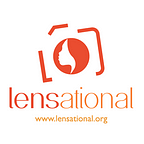7 years on: lessons from building a global movement and not just a social enterprise
Bonnie Chiu, Founder and CEO of Lensational
When I started Lensational 7 years ago on this day, I didn’t really know what it would mean to be a founder. At that point, I was 20 years old and had led some student societies, but I wasn’t prepared for leading a global movement.
Leadership is a continuous learning journey, and while I still don’t have all the answers, the past 7 years have brought important learnings, which I would like to share.
Before I go on, it is important to note that these are lessons based on Lensational being a global movement of people, who believe passionately in women and girls being represented, as opposed to Lensational being defined purely as a social enterprise.
This distinction was a conscious decision, which we articulated back in 2017, after trying to pursue traditional social enterprise growth via revenue. At that point, impact growth was our primary driver, and thus, our structure was different from a more traditional social enterprise, which defines growth of impact through revenue growth. And thus, there is probably a subtle difference between leading a global movement, and leading a business.
‘When you are trying to build something, and to prove yourself to funders and supporters, it can be tempting to appear that ‘we’ve got it all’ to instil confidence.’
Lesson №1: Be bold
Last year, I was asked to speak about bold leadership, at the Think Future conference. Before that, I never consciously thought about this concept. But the more I thought about it, the more I felt bold leadership has been something that influenced the decisions we made.
When you are trying to build something, and to prove yourself to funders and supporters, it can be tempting to appear that ‘we’ve got it all’ to instil confidence. But I think we quickly realised that, being such a nascent movement where things evolved rapidly, we may make mistakes and that’s ok. We would be able to learn from them, and to share and apply these learnings quickly.
This approach allowed us to stay true to our intentions, and, in the world of “Fake it til you make it” (see this startup guide for Millennials), to chart our own way of growth and deviate from industry norms. I think this was quite a bold thing to do then.
Lesson №2 : Collective Leadership
As part of our boldness, we have consciously decided to take a collective leadership approach, rather than an heroprenership (or Founder-centric) approach. This means we are disqualified from some funding opportunities that require the founder to be working on the venture full time.
However, it is a model that allows us to preserve our community and participatory ethos, while taking advantage of talented women who have a range of roles and networks to contribute.
This is why starting in April 2020, we plan to transition from labels such as CEO and Chair, reflecting our collective leadership model. This is an experiment for us, but bold leadership shouldn’t just be about replicating what’s gone before us, but also redefining what good leadership can look like.
Lesson №3: Exit to the community
In November 2019, I had the opportunity to speak on the same panel with Nathan Schneider, who has been pioneering the platform Cooperative movement, which is about democratic ownership and governance.
When Lensational scaled organically to reaching 23 countries in 2018, we did not think about how the community could truly own what we are doing. As most of our funders are based in the UK, we centralised operations in the UK instead, through our charity, and as part of that process, the decision-making for our global activities was largely concentrated in London.
We started becoming like a traditional international NGO. But learning about platform cooperativism has led us a different way. We now have created a structure that is light at the top (a Minimum Viable Board), and instead, that seeks to channel as many resources to the grassroots as possible.
New decade, new Lensational
Based on the lessons we have learnt, we will see trialling some improvements to Lensational in the 2020's, which we will cover in upcoming blog posts. But the most important one to announce today, on our 7th anniversary, is that we are officially setting up regional hubs — adding to Hong Kong, to include Kenya and Ghana, reflecting the ground-up nature of our global network.
The hubs will be peer hubs, supporting one another other, sharing resources and learnings. Furthermore, our Programme Leads in each of the Hubs will be paid wherever possible, moving away from our volunteer-centric approach.
In Kenya, we are excited that Lydia Wanjiku, who has been with Lensational for the past 5 years, is joining us as a full-time paid team member. In Ghana, we are looking to hire a Lensational alumna to support on programme management, with the Ghana and Kenya hubs working closely together.
These three regional hubs will be supported by a Global Coordination team run by volunteers, providing advocacy, communications and operational support. And the next immediate step in the next 3 months will be for us to develop a Lensational Charter, led by the regional hubs, in order to develop a set of principles and values that define our movement globally.
We are committed to sharing learnings on the regional hubs network, believing there is a better way of organising than the traditional top-down development approach adopted by international NGOs.
Wishing you the happiest International Women’s Day,
Bonnie (& the Lensational team).
